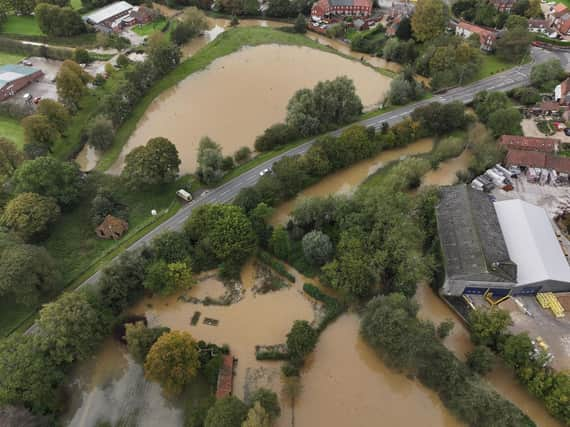Lincolnshire seeks to “build resilience” over “constant” flood threat


Storm Babet was an unprecedented occasion in October 2023, where two months of rainfall arrived in just one day, and despite some extensive storm defences in Lincolnshire, including an £8 million system in Horncastle, communities were still ransacked by the extreme weather.
Some 450 incidents were related to Storm Babet in a matter of a few days, making it an all-time high for such events, and just as the recovery operations were rounding up, the next wave arrived in the form of Storm Henk in January 2024.
Advertisement
Hide AdAdvertisement
Hide AdLincolnshire County Council’s (LCC) investigations into the impact of the recent Storm Henk floods found the western side of the county to be the worst affected, but incidents were reported all over the county.
A total of 124 properties were impacted by internal flooding, while external flooding affected 168, and 388 of the properties flooded by Storm Henk were also hit by Storm Babet at the end of last year.
Coun Colin Davie, portfolio holder for economic development, environment and planning, said it was an “issue that clearly needs to be looked at” and warns the numbers are “likely to go up, not down” as investigations continue.
He said: “Quite clearly, the events of the last few months have taught me, with environment in my portfolio, that we’re going to need more resources to deal with some of the challenges related to climate change, causing flooding incidents.
Advertisement
Hide AdAdvertisement
Hide Ad“Two major incidents in three months is putting a considerable amount of pressure and burden on the system.”
Government flood resilience grants distributed through district councils offer up to £5,000 per property, with the money claimed back in two stages for survey works and physical construction after the work is completed.
There are also farming recovery grants available for up to £25,000, and smaller recovery grants have been made available to local authorities to the tune of £500 per household for immediate clean-up operations.
Leader of the county council, Coun Martin Hill, said that “where ownership is uncertain, the onus is on us to do our best” to support people affected by flooding. He plans to write to central government to seek additional funding.
Advertisement
Hide AdAdvertisement
Hide AdCoun Hill called the risk of flooding an “ongoing and constant threat” before saying: “Clearly, maintained assets need more investment than is currently going in.
“We could argue that it’s not our direct responsibility, but we have a moral responsibility to do what we can to help residents, particularly those where issues can be quickly resolved.
“These events are going to happen in the future and we need to be prepared.”
This came after councillors recommended a five percent increase to council tax for Lincolnshire residents for 2024/25, which the county council’s leader says will help towards flood protection.
Advertisement
Hide AdAdvertisement
Hide Ad“There should be an expectation that some of the extra resources from higher tax should be looked at in terms of what more we can do to protect people from flooding,” Coun Hill told the executive.
Coun Davie confirmed the county council’s intentions to write to government over this issue, in the hopes of “influencing the upcoming Spring Budget announcement.”
He called for the council to “focus investment on the here and now” and not “20 to 30 years from now” in an effort to “build community resilience” in the face of future flood threats to the county.